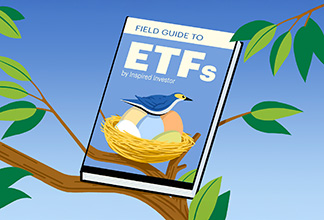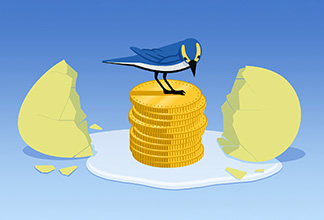How Do ETFs Compare to Mutual Funds?
Published on February 24, 2020
minute read
Share:
Copy adapted from RBC Global Asset Management's article "An investor-friendly guide to mutual funds and ETFs".
Mutual funds and exchange-traded funds (ETFs) are both excellent tools for building a diversified investment portfolio, but they operate in slightly different ways. Understanding these differences can help you make more informed decisions — it all depends on your goals, preferences and circumstances.
Similar goals, different mechanics
Both mutual funds and ETFs aim to give you access to a diversified basket of securities, such as stocks or bonds. This diversification helps reduce concentration risk. However, there is a difference in how the two trade:
• Mutual funds: Trades are typically executed once per day, after the market closes. The price is based on the fund’s net asset value (NAV), which is calculated at the end of the trading day.
• ETFs: These are traded throughout the day on an exchange, just like individual stocks. Prices fluctuate in real-time based on market activity and the value of the underlying holdings.
ETFs offer flexibility for investors who want to take advantage of intraday price movements. Mutual funds, on the other hand, offer an end-of-day pricing approach.
Active or index-tracking? The choice is yours
A common misconception is that ETFs are always passive, index-tracking investments, while mutual funds are exclusively actively managed. In reality, both vehicles can adopt either strategy:
• Active management: Aims to outperform a benchmark or achieve a specific goal by strategically selecting securities.
• Index-tracking: Aims to replicate the performance of a specific benchmark or index.
For example, there are actively managed ETFs designed to deliver higher returns than their benchmarks. There are mutual funds that simply track an index. When deciding between active management and index-tracking, it’s less about the type of vehicle (mutual fund or ETF) and more about your investment goals and risk tolerance.
Fees: not the whole story
There are two costs to consider when choosing one of these fund types: management expense ratios (MERs) and trading commissions. MERs for mutual funds tend to be higher, while MERs for ETFs tend to be lower. But it’s typically a good idea to compare comparables. Mutual funds traditionally have higher MERs because they are traditionally actively managed, but you can get a passive mutual fund and the fees will be lower, and you can get an actively managed ETF and the fees will be higher.
• Lower fees for index-tracking strategies.
• Higher fees for active ones.
Depending on how much you want to invest and your trading style, you may want to consider calculating how much trading commissions and MERs you may incur for the fund holding.
Which is right for you?
The choice between mutual funds and ETFs comes down to your individual goals, preferences and circumstances. Both offer valuable ways to build a diversified portfolio. Both can be tailored to fit your needs. When evaluating your options, consider factors like management style, fees, overall performance and trading flexibility. By understanding these differences, you’ll be better equipped to make informed investment decisions and achieve your financial goals.
RBC Direct Investing Inc., RBC Global Asset Management Inc. and Royal Bank of Canada are separate corporate entities which are affiliated. RBC Direct Investing Inc. is a wholly owned subsidiary of Royal Bank of Canada and is a Member of the Canadian Investment Regulatory Organization and the Canadian Investor Protection Fund. Royal Bank of Canada and certain of its issuers are related to RBC Direct Investing Inc. RBC Direct Investing Inc. does not provide investment advice or recommendations regarding the purchase or sale of any securities. Investors are responsible for their own investment decisions. RBC Direct Investing is a business name used by RBC Direct Investing Inc. ® / ™ Trademark(s) of Royal Bank of Canada. RBC and Royal Bank are registered trademarks of Royal Bank of Canada. Used under licence.
© Royal Bank of Canada 2025.
There may be commissions, trailing commissions, investment fund management fees and expenses associated with investment fund and exchange-traded fund (ETF) investments. RBC Direct Investing Inc. does not offer mutual funds that pay trailing commissions in accordance with rule changes banning such payments to order execution only dealers effective June 1, 2022. To the extent that mutual funds paying trailing commissions are transferred into RBC Direct Investing Inc. or were held at RBC Direct Investing Inc. prior to June 1, 2022, and cannot be switched into an equivalent non-trailer paying fund, any trailing commissions paid to RBC Direct Investing Inc. will be rebated to clients. Before investing, please review the applicable fees, expenses and charges relating to the fund as disclosed in the prospectus, fund facts or ETF facts for the fund. Mutual funds are not guaranteed, their values change frequently and past performance may not be repeated. For money market funds there can be no assurances that the fund will be able to maintain its net asset value per security at a constant amount or that the full amount of your investment in the fund will be returned to you.
Any information, opinions or views provided in this document, including hyperlinks to the RBC Direct Investing Inc. website or the websites of its affiliates or third parties, are for your general information only, and are not intended to provide legal, investment, financial, accounting, tax or other professional advice. While information presented is believed to be factual and current, its accuracy is not guaranteed and it should not be regarded as a complete analysis of the subjects discussed. All expressions of opinion reflect the judgment of the author(s) as of the date of publication and are subject to change. No endorsement of any third parties or their advice, opinions, information, products or services is expressly given or implied by RBC Direct Investing Inc. or its affiliates. You should consult with your advisor before taking any action based upon the information contained in this document.
Furthermore, the products, services and securities referred to in this publication are only available in Canada and other jurisdictions where they may be legally offered for sale. If you are not currently a resident of Canada, you should not access the information available on the RBC Direct Investing Inc. website.
Inspired Investor brings you personal stories, timely information and expert insights to empower your investment decisions. Visit About Us to find out more.










